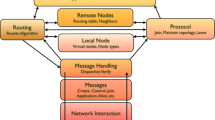Abstract
Peer-to-Peer (P2P) computing is widely recognized as a promising paradigm for building next generation distributed applications. However, the autonomous, heterogeneous, and decentralized nature of participating peers introduces the following challenge for resource sharing: how to make peers profitable in the untrusted P2P environment? To address the problem, we present a self-policing and distributed approach by combining two models: PET, a personalized trust model, and M-CUBE, a multiple-currency based economic model, to lay a foundation for resource sharing in untrusted P2P computing environments. PET is a flexible trust model that can adapt to different requirements, and provides the solid support for the currency management in M-CUBE. M-CUBE provides a novel self-policing and quality-aware framework for the sharing of multiple resources, including both homogeneous and heterogeneous resources. We evaluate the efficacy and performance of this approach in the context of a real application, a peer-to-peer Web server sharing. Our results show that our approach is flexible enough to adapt to different situations and effective to make the system profitable, especially for systems with large scale.
Similar content being viewed by others
References
E. Adar and B. Huberman, Free riding on gnutella, First Monday 5(10) (2000).
Y. Amir, B. Awerbuch and R. Borgstrom, A cost-benefit framework for online management of a metacomputing systems, in: Proc. of the first Inernational Conference on Information and Computational Economy (1998).
P. Barford and M.E. Crovella, Generating representative web workloads for network and server performance evaluation, in: Proceedings of Performance ′98/ACM SIGMETRICS ′98 (1998).
M. Blaze, J. Feigenbaum and J. Lacy, Decentralized trust management, in: IEEE Symposium on Security and Privacy (1996).
R. Buyya, D. Abramson and J. Giddy, A case for economy grid architecture for service-oriented grid computing, in: Proceedings of the 10th IEEE International Heterogeneous Computing Workshop (2001).
B. Chun, Market-based cluster resource management, Ph.D. thesis, Department of Electrical Engineering and Computer Science, UC Berkeley (2001).
F. Cornelli, E. Damiani, S.D.C. Vimercati, S. Paraboschi and P. Samarati, Choosing reputable servents in a P2P network, in: Proc. of the 11th International World Wide Web Conference (2002).
J. Douceur, The Sybil Attack, in: Proc. of the 1st International Workshop on Peer-to-Peer Systems (IPTPS′02) (2002).
Y. Fu, J. Chase, B. Chun, S. Schwab and A. Vahdat, SHARP: An Architecture for secure resource peering, In: Proc. of the 19th ACM Symp. on Operating Systems Principles (SOSP-19) (2003).
R. Gupta and A.K. Somani, CompuP2P: An architecture for sharing of compute power in peer-to-peer networks with selfish nodes, in: Second Workshop on the Economics of Peer-to-Peer Systems, Harvard University (2004).
D. Hausheer, N.C. Liebau, A. Mauthe, R. Steinmetz and B. Stiller, Token-based accounting and distributed pricing to introduce market mechanisms in a peer-to-peer file sharing scenario, in: Third International Conference on Peer-to-Peer Computing (P2P′03) (2003).
H. Junseok, The economics of dynamic bandwidth transaction service: toward pricing modeling, in: MSI Workshop on Modelling, University College London, (2001) pp. 18–19.
S. Kamvar, M.T. Schlosser and H. Gacia-Molina: The eigentrust algorithm for reputation management in P2P networks, in: Proc. of the 12th International World Wide Web Conference (2003).
Z. Liang and W. Shi, Enforcing cooperative resource sharing in untrusted peer-to-peer environment, Technical report MIST-TR-2004-014, Department of Computer Science, Wayne State University (2004).
Z. Liang and W. Shi, Analysis of recommendations on trust inference in the open environment, Technical report MIST-TR.-2005-002, Department of Computer Science, Wayne State University (2005).
S. Marsh, Formalising trust as a computational concept, Ph.D. thesis, University of Stirling (1994).
L. Mui, M. Mohtashemi and A. Halberstadt, A Computational model of trust and reputation, in: Proceedings of the 35th Hawaii International Conference on System Sciences (2002).
J. Ravi, Z. Liang and W. Shi, A Case for peer-to-peer web server sharing, Technical Report MIST-TR.-2003-010, Department of Computer Science, Wayne State University (2003).
Y. Wang and J. Vassileva, Trust and reputation model in peer-to-peer networks, in: Third International Conference on Peer-to-Peer Computing (P2P′03) (2003).
B. Yang and H. Carcia-Molina, PPay: Micropayments for peer-to-peer systems, in: Proceedings of ACM CCS′03 (2003).
T. Zhao and V. Karamcheti, Enforcing resource sharing agreements among distributed server clusters, in: Proceedings of the 16th International Parallel and Distributed Processing Symposium (IPDPS) (2002).
Author information
Authors and Affiliations
Corresponding author
Additional information
Weisong Shi is an Assistant Professor of Computer Science at Wayne State University. He received his B.S. from Xidian University in 1995, and Ph.D. degree from the Chinese Academy of Sciences in 2000, both in Computer Engineering. His current research focuses on dynamic Web content delivery, trusted resource sharing in peer-to-peer systems, mobile computing, and wireless sensor networks. Dr. Shi has published more than 40 peer-reviewed journal and conference papers in these areas. He is the author of the book “Performance Optimization of Software Distributed Shared Memory Systems” (High Education Press, 2004). He has also served on technical program committees of several international conferences, including the chair of poster track of WWW 2005. He is a recipient of Microsoft Fellowship in 1999, the President outstanding award of the Chinese Academy of Sciences in 2000, one of 100 outstanding Ph.D. dissertations (China) in 2002, “Faculty Research Award” of Wayne State University in 2004, the “Best Paper Award” of ICWE'04 and IPDPS'05. He is a member of ACM, USENIX, and IEEE.
Zhengqiang Liang is a Ph.D. Student in computer science at Wayne State University. His current researches focus on trusted and cooperative resource sharing in the open environment, and computer economics. He received his B.S degree in 1997 and M.S. degree in 2001 from Harbin Institute of Technology (HIT) in China, both in Computer Science and Engineering.
Rights and permissions
About this article
Cite this article
Liang, Z., Shi, W. Enforcing Cooperative Resource Sharing in Untrusted P2P Computing Environments. Mobile Netw Appl 10, 971–983 (2005). https://doi.org/10.1007/s11036-005-4453-5
Published:
Issue Date:
DOI: https://doi.org/10.1007/s11036-005-4453-5




